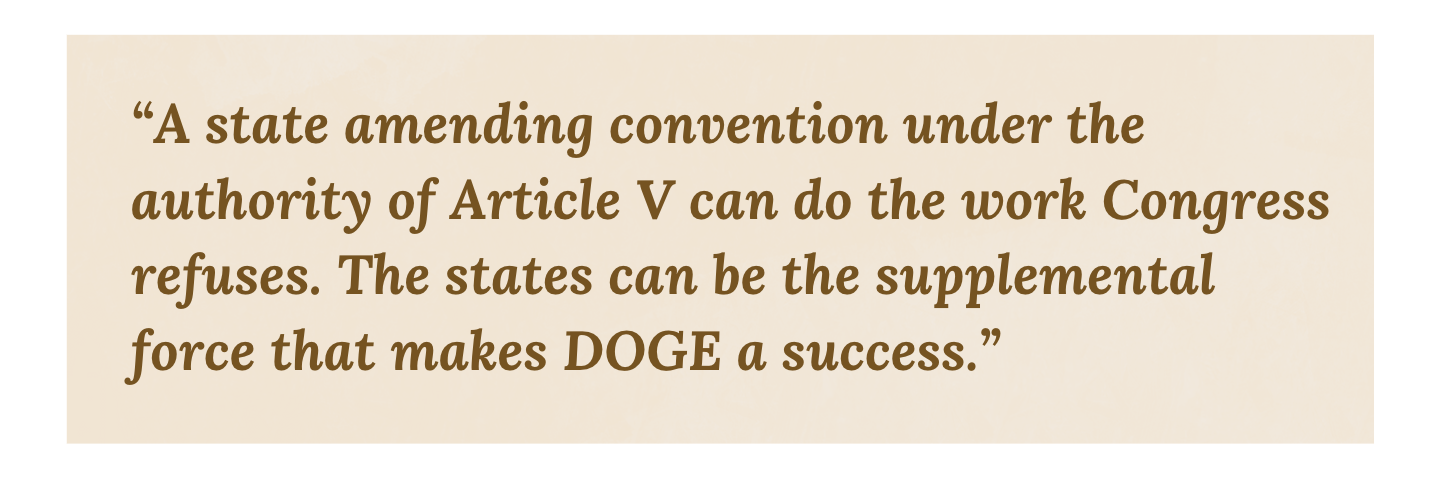Without the collective power of the states, the efforts of DOGE will struggle.
It has never been more clear that the remaining fifteen states must immediately call for a state amending convention under the authority of Article V. Nineteen have already passed the Convention of States resolution which covers the very things DOGE will propose to improve the efficiency of the federal government: fiscal responsibility, overreach, and term limits.
While the newly instituted DOGE advisory commission is a move in the right direction, it cannot pass the necessary legislation to initiate the treatment plan for our federal government which remains addicted to spending. DOGE merely sets the stage for reducing federal expenditure, and the size and scope of government.
Among other directives, DOGE is expected to make specific recommendations for reducing unnecessary federal agencies, cutting regulation, and initiating mass layoffs of federal employees.
All told, the pragmatic minds of DOGE’s Elon Musk and Vivek Ramaswamy are expected to recommend to the new Congressional DOGE Caucus how and where to cut $2 trillion from the annual federal budget.
But who will initiate this “addiction treatment plan” once it is outlined? The DOGE caucus must have the cooperation of Congress in order to pass legislation to address the aggressive cuts proposed by Musk and Ramaswamy's commission.

Will Congress support the efforts of DOGE and pass the necessary legislation to initiate fiscal responsibility?
Not likely.
If history is any indication, the answer must be no. In 1984, Ronald Reagan initiated the Grace Commission with the same objectives as DOGE. This two-year private sector commission had made 2,500 recommendations for reducing federal waste and inefficiency, saving $424 billion across three years.
A sad omen on multiple levels for our disposition today, the Grace Commission was a failure. Only 30% of the recommended budget cuts were initiated. And at that, these were done by executive order, a method easily reversed by subsequent administrations.
The balance of the Grace Commission’s action items were left to the discretion of Congress which did not act.
Currently, there is no traditional path for successfully driving the recommendations of DOGE. Expected to complete its work by July, 2026, DOGE will run out of time. Without looking to the Article V method of lawmaking, specifically the novel state amending convention, our new "commission of dreams," like the Grace Commission, will prove merely a charade.
For the next two years, there will be slim DOGE-supporting majorities in Congress with certain losses expected in the 2027 mid-term election.
A state amending convention under the authority of Article V can do the work Congress refuses. The states can be the supplemental force that makes DOGE a success.
Amendments to the Constitution create permanent modifications to federal government by-laws. Historically, they are popular among the people and are effectively followed.
Temporary fixes by executive order do not offer powerful and permanent solutions as evidenced by Trump's incomplete border wall whose construction was terminated with just the stroke of Biden's shaky pen.
Similarly, austerity measures for addressing federal debt are rarely contiguous across presidential administrations. Only pragmatic directives in the form of amendments can ensure enduring federal government restraint.
Fifteen more states must look to the US Constitution and with haste call for the passage of the Convention of States resolution in their respective legislatures. Without this powerful tool in place to drive the agenda, Americans will again remain spectators of another big government “DOGE” and pony show.
Learn more how the states can invoke Article V at: www.ConventionofStates.com.






